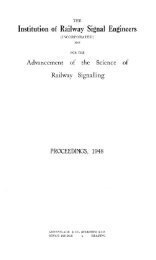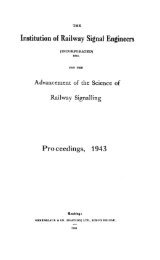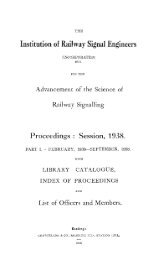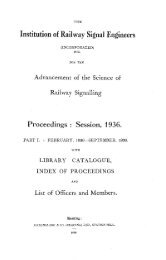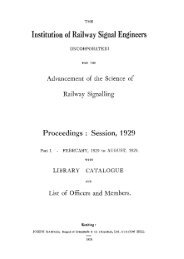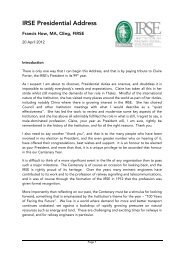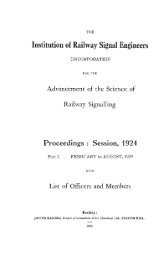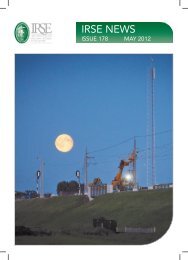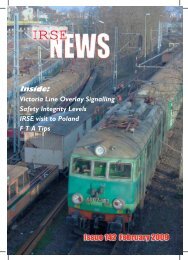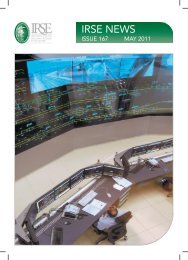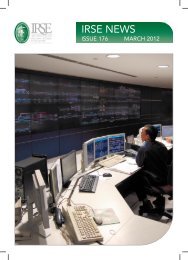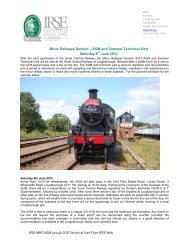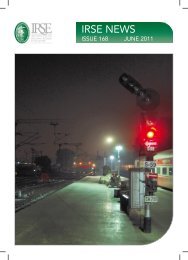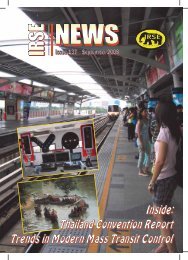IRSE News 140 Dec 08.pdf
IRSE News 140 Dec 08.pdf
IRSE News 140 Dec 08.pdf
You also want an ePaper? Increase the reach of your titles
YUMPU automatically turns print PDFs into web optimized ePapers that Google loves.
SECTION NEWS<br />
Younger Members Section<br />
This year, the Younger Members’ (YM) calendar<br />
has been full, as usual! We have held two main<br />
events, which have reflected appropriate<br />
technology, practice and processes current within<br />
the industry. We have also supported countless<br />
other events, such as the introductory day at<br />
ASPECT 2008, and a Railway Engineers Forum<br />
event, the Intelligent Railway in September.<br />
A more recent addition to the YM calendar has<br />
been the development of several <strong>IRSE</strong> exam<br />
specific workshops, tailored to aide students to<br />
achieve the much relished status of M<strong>IRSE</strong>! This<br />
year we held a one day study session in Watford<br />
aimed at kick starting the revision process for<br />
students sitting the exams. This was followed by a<br />
weekend seminar at Signet Solutions in Derby<br />
specifically which targeted students studying for<br />
modules 2 and 3 in October. In these events<br />
alone we have helped over 50 of our members in<br />
their quest to become full members of the<br />
institution.<br />
In addition to the workshops and study groups<br />
an exam forum has also been set up on the<br />
internet to promote exam discussion, to help the<br />
student feel less isolated. Whether a younger<br />
member studying for exams or a mature member<br />
willing to impart experience, check it out at<br />
www.irseexam.co.uk .<br />
Further adventures within the YM world include<br />
the YM Forum, which allows members worldwide<br />
to share ideas, and present papers.<br />
<strong>IRSE</strong><br />
The first paper was presented to a main London meeting in February<br />
on Next Generation Train Detection. Many thanks to Rob Ireland for all<br />
his work on this over the last few years. Watch out for future features on<br />
this, with the next paper proposed on the 15 January at the YM half day<br />
seminar.<br />
We also ventured in to Europe for the first time on an YM international<br />
technical visit. From 9 to 11 October a group of 15 young members<br />
descended on the German capital Berlin. Here we visited the DB ICE<br />
maintenance depot finding out about German maintenance methods and<br />
about LZB train control; Thaleses ERTMS / interlocking testing facility; the<br />
U-Bahn traffic control centre and finally a German heritage signalling<br />
museum. Thanks must go to Ken Dogget for organising a fantastic event<br />
which will be remembered not only for the educational content but as a<br />
great social event.<br />
The introductory day of ASPECT 2008 was a tremendous success,<br />
with nearly 100 attendees. Martin Fenner and Olga Wisniewska led the<br />
event for the YM and have proved invaluable to the YM team.<br />
The annual seminar was held this year in Glasgow on the<br />
20 November. The focus was on “Expanding Scotland’s Railways” and we<br />
had an extensive programme covering many exciting Scottish projects,<br />
with a visit to the new West of Scotland Signal Centre. The day was a<br />
great success, with over 80 attendees. Just goes to show that good<br />
things do happen in Scotland! Thanks to the Scottish Section and well<br />
done!<br />
2009 promises to be just as good with YM events planned throughout<br />
the year. Next year we intend to continue the trend of exam workshops<br />
and run events for modules 1, 2, 3 and 5. We also wish to repeat the YM<br />
international technical visit with France or Holland looking like possible<br />
venues. As usual we rely on senior members to add their support so we<br />
would like to encourage you all to get in touch and offer your services. If<br />
you feel you may be able to help with events please don’t hesitate to<br />
contact us at younger.members@irse.org.<br />
Andrew Witton<br />
From previous page<br />
Employers and learners often ask: what is this<br />
qualification worth and how does it compare with<br />
other qualifications? These will be easier to<br />
answer in the future as new credit frameworks will<br />
provide a currency for comparing different<br />
achievements.<br />
Qualifications will be put together by combining<br />
units of achievement. The rules that govern how<br />
qualifications are put together will be transparent<br />
and industries will be able to influence them to<br />
ensure that qualifications really are “what it says<br />
on the label”. Awarding Bodies will have increased<br />
flexibility to build qualifications that meet<br />
employers’ needs. Qualifications will continue to<br />
exist as recognised structures and will have levels<br />
assigned to them as they do now. And, in England,<br />
employers can become an Awarding Body<br />
themselves if they wish to.<br />
GoSkills, the industry’s Sector Skill Council, will<br />
be working with the industry over the next two<br />
years to make sure the qualifications that come<br />
out of this change in vocational qualifications meet<br />
the industry needs<br />
For further information contact<br />
kevin.marchand@goskills.org.<br />
Midland and North Western Section<br />
The first meeting of the 2008-9<br />
Session was on Tuesday 14 October,<br />
hosted by Signet Solutions in their<br />
training centre at the RTC Business<br />
Park in Derby. The generous provision<br />
of cakes was much appreciated by the<br />
20 members and guests attending.<br />
The speaker was one or our own<br />
members, Chris Hall, who is based in<br />
the Derby office of the Rail Accident<br />
Invest-igation Branch (RAIB). The<br />
organisation was set up in response<br />
to the Ladbroke Grove enquiry and the<br />
European Rail Safety Directive, to<br />
separate accident investigation from<br />
other safety regulatory responsibilities,<br />
and it has now been<br />
operational for three years. The scope<br />
covers main line railways, metros,<br />
tramways and heritage railways over<br />
350 mm gauge, in Great Britain,<br />
Northern Ireland and to half way<br />
through the Channel Tunnel.<br />
The talk described the legal basis<br />
for RAIB’s operations and the processes,<br />
by which they respond to accidents,<br />
investigate on the ground, analyse<br />
causes and make recommend-ations to<br />
reduce the risk of future accidents of<br />
similar type. As a practical illustration,<br />
Chris described a freight train<br />
derailment with a signalling element<br />
that occurred at Maltby, between<br />
Doncaster and Worksop. The immediate<br />
cause was a SPAD at a mechanical<br />
signal when the signaller was moving<br />
points in the overlap. RAIB identified<br />
the causal and contributory factors<br />
leading to the accident, and<br />
recommended that time of operation<br />
locking should be provided for points<br />
in the overlap (already specified in<br />
the control tables but not implemented<br />
in the circuits).<br />
Chris finished the talk with some<br />
interesting statistics about the 125<br />
24<br />
Issue <strong>140</strong> <strong>Dec</strong>ember 2008<br />
<strong>IRSE</strong><br />
NEWS



